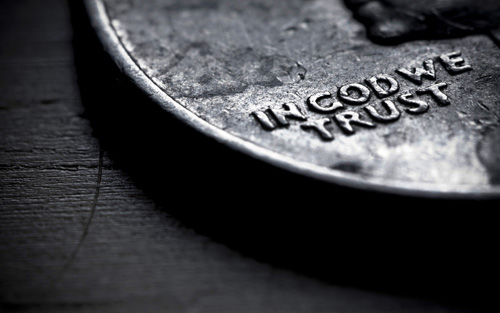
Do you ever wonder why we pray? I mean, God is love, he’s all knowing, he’s sovereign, omni-everything, right? So… why should I reiterate what he already knows, especially since he also knows what comes next?
Yes. So have I.
In fact, I often wonder all of that while I am praying.
It happens when I make nearly every request of any kind. “God, my friend’s grandma has so many health issues right now … which… you already know, but… well, it would be nice if you could, I mean… I know you CAN… so, they’d like for her to be healed, obviously… except, if you know a reason—I mean, of course you DO have a reason, and know one… if you do…—for her to not be healed, then we want that, instead of what we’re asking. I’m pretty sure. InJesusNameAmen.”
Something like that.
But, really… if God knows everything, and we really do trust him with all that we are (and whatever is, and is to come) then… why do we pray?
Some of Jesus’ most famous words are what is commonly referred to as “The Lord’s Prayer”. He precedes this “Lord’s Prayer” with the words, “When you pray… you should pray like this:”
That sounds important. We like “How To”s.
Our Father in heaven,
may your name be kept holy.
OK. Holy. Different. Other. Remember that we are not God, that he is, and keep our perspective properly calibrated. Got it.
May your Kingdom come soon.
May your will be done on earth,
as it is in heaven.
It really can be lousy here sometimes. So I understand why we should ask for this. But every time? Maybe it is a perspective thing again? It does remind us that we are not in control. We don’t get to pick when God’s Kingdom will exist “on earth, as it does in heaven”.
We really don’t. Have you seen the news lately? The crazy abortion guy in Philadelphia? The government is getting more and more intrusive, says the NSA Whistleblower? Hurricanes, earthquakes, tornadoes… deaths and destruction? The Middle East is always on fire, everyone wanting everyone else dead (and working hard to make it happen).
Yuck. And that’s just the “world out there”. Don’t we all have our own messes?
Yep. We do.
I’m definitely on board with this, “May your Kingdom come soon” part.
Give us today the food we need,
OK, daily provision. Not a week’s (or month’s!) worth of food in the fridge and freezer and pantry… daily food. Sounds like another reminder for us that we need God. More perspective.
Apparently Jesus knows we need lots of perspective adjustment each time we talk with God?
and forgive us our sins,
as we have forgiven those who sin against us.
Huh. Look at that. More perspective setting.
First, we are sinners. (Forgive our sin…) That’s perspective right there. I don’t have it all together. I’m not without blame, error, nor evil.
But the second part is the other perspective setter: forgive as we forgive others who have wronged us.
Hmm. So our own forgiveness (before we even get to ask God about what we were praying for in the first place …) is dependent upon how forgiving we are to people who are mean to us?
Looks like it.
But I don’t think it’s just God saying, “Lalalalala.. I’m not LIST-en-ing…. until you forgive your brother! Oh, and your neighbors, too, while you’re at it.” I think we’re back to the perspective setting. How can we ask for, and expect God to forgive our wrongs when we won’t do the same for somebody else?
We really can’t.
And don’t let us yield to temptation,
but rescue us from the evil one.
Satan. The Evil One. One, not just … evil, as a generic term. So another perspective adjustment, this time to remember that our battle is not with flesh and blood, but a very real, spiritual one.
I understand. Paul says this in Galatians:
“So I advise you to live according to your new life in the Holy Spirit. Then you won’t be doing what your sinful nature craves. The old sinful nature loves to do evil, which is just opposite from what the Holy Spirit wants. And the Spirit gives us desires that are opposite from what the sinful nature desires. These two forces are constantly fighting each other, and your choices are never free from this conflict. (Gal 5:16-17)
Everyday, all day there is a war inside me. One side wanting to serve self, the other to deny self; preferring submission to Spirit, and often to others.
It makes sense, then, to first remember the battle exists, and is ongoing, and also to ask for help standing up against it.
Wait. What? Where’s the rest? Where’s the, “And please help Aunt Mary…” or the “And I need a [fill in the need blank]…”?
They aren’t there.
Jesus did perhaps add “For yours is the kingdom and the power and the glory forever. Amen.” That line is in some manuscripts we have, and not in others.
But there is still not a “Insert your [real] requests here…” part.
Fascinating, huh?
So Jesus said, “When you pray, pray like this.” And nearly all of it is just perspective rebuilding. Maybe it’s just important that we remember (1) there is a powerful, loving God, and (2) you’re not him.
(Neither am I.)
So, for the sake of context, In the previous paragraphs, Jesus makes sure that his disciples know that praying is not for show. In fact, he says pray in your closet. (Do you do that? I don’t think I ever have…) He also says don’t “babble on and on”. More words does not mean more power. Apparently, it’s not like having more raffle tickets gets you a better chance of winning the prize.
And later on, in the next chapter (chapters being as we have divided them, post-Jesus) he gets back to the topic of prayer with these words:
Keep on asking, and you will receive what you ask for. Keep on seeking, and you will find. Keep on knocking, and the door will be opened to you. For everyone who asks, receives. Everyone who seeks, finds. And to everyone who knocks, the door will be opened.
You parents—if your children ask for a loaf of bread, do you give them a stone instead? Or if they ask for a fish, do you give them a snake? Of course not! So if you sinful people know how to give good gifts to your children, how much more will your heavenly Father give good gifts to those who ask him.
So … don’t use a lot of words, but… ask a lot? Not sure what Jesus is trying to say here, other than trust your Father.
Maybe that is all he’s trying to say?
God is good. (And he is God.) He loves you, far better than even the best dad could. He’s listening, and wants to forgive wrongs, and protect from future bad choices.
Remind us who we are, and who you are, God.
And that’s how—and why—to pray.


 There’s a song. It’s a song that I wrote. The words actually seem a bit out of order:
There’s a song. It’s a song that I wrote. The words actually seem a bit out of order: Rest is currently the word reverberating through various sectors of my life.
Rest is currently the word reverberating through various sectors of my life.
 Deep within the heart of mankind is a hesitancy, if not an outright refusal to accept responsibility. Some of us are able to work up the courage on occasion, but generally our first (and second, and third) response is to point the finger at someone else.
Deep within the heart of mankind is a hesitancy, if not an outright refusal to accept responsibility. Some of us are able to work up the courage on occasion, but generally our first (and second, and third) response is to point the finger at someone else. And, honestly, she doesn’t really agree with my instruction, that Christianity is not the same as Jesus.
And, honestly, she doesn’t really agree with my instruction, that Christianity is not the same as Jesus. We’re getting really, really close to Christmas Day. Have you noticed? Throngs of folks out picking up gifts for everyone they love—and maybe some they don’t—all hoping that the recipient will feel the love held for them by the giver through the gift chosen and given.
We’re getting really, really close to Christmas Day. Have you noticed? Throngs of folks out picking up gifts for everyone they love—and maybe some they don’t—all hoping that the recipient will feel the love held for them by the giver through the gift chosen and given.